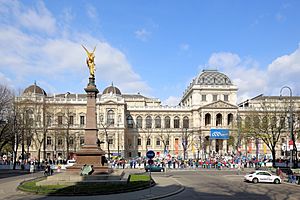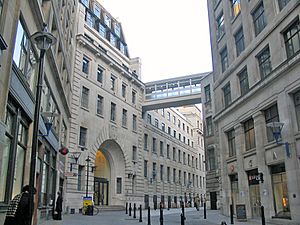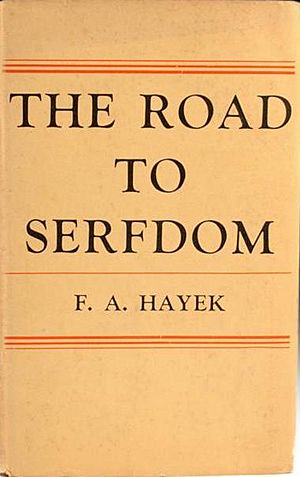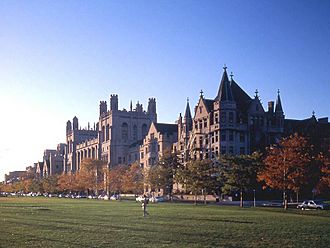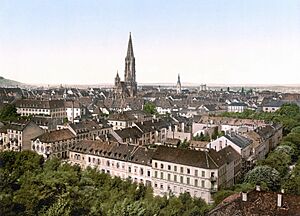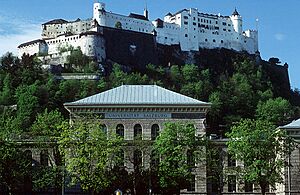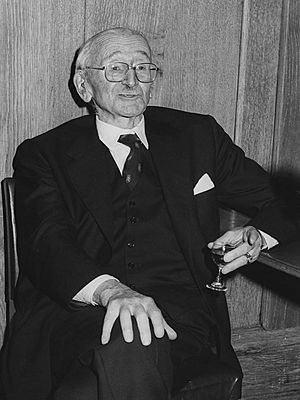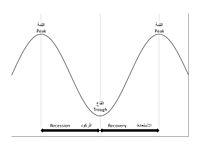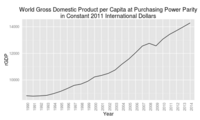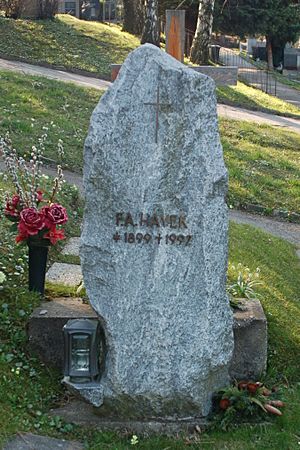Friedrich Hayek facts for kids
Quick facts for kids
Friedrich Hayek
|
|
|---|---|
 |
|
| Born |
Friedrich August von Hayek
8 May 1899 Vienna, Cisleithania, Austria-Hungary
|
| Died | 23 March 1992 (aged 92) Freiburg im Breisgau, Baden-Württemberg, Germany
|
| Citizenship | Austrian (1899–1938) British (1938–1992) |
| Institution |
|
| Field |
|
| School or tradition |
Austrian School |
| Alma mater | |
| Influences | |
| Contributions |
|
| Awards | |
| Information at IDEAS / RePEc | |
| Signature | |
Friedrich August von Hayek (born May 8, 1899 – died March 23, 1992) was an important thinker. He was an Austrian-British economist, political scientist, and philosopher. People often called him F. A. Hayek.
Hayek won the 1974 Nobel Memorial Prize in Economic Sciences. He shared it with Gunnar Myrdal. They were recognized for their work on money, how economies change, and how economic, social, and political things are connected. Hayek's ideas on how prices share information in an economy were especially important.
During his teenage years, Hayek fought in World War I. He later said this experience made him want to study economics. He wanted to help prevent future wars. He earned degrees in law and political science from the University of Vienna. He lived and worked in Austria, Great Britain, the United States, and Germany. He became a British citizen in 1938. He taught at the London School of Economics, the University of Chicago, and the University of Freiburg. He is a key figure in the Austrian School of Economics.
Hayek's ideas greatly influenced political movements in the 20th century. They still affect thinkers today. He was sometimes called a conservative, but he preferred to be known as a classical liberal. He helped bring back classical liberal ideas after World War II. His most famous book, The Road to Serfdom, has sold millions of copies.
Hayek received many honors for his work. In 1984, he became a Companion of Honour. In 1991, he received the Presidential Medal of Freedom from President George H. W. Bush. His article "The Use of Knowledge in Society" was named one of the top 20 articles in the American Economic Review in its first 100 years.
Contents
- Life Story
- Key Ideas and Views
- Influence and Recognition
- Personal Life
- Legacy and Honors
- Important Books
- See Also
Life Story
Early Years and Family
Friedrich August von Hayek was born in Vienna, Austria. His father, August von Hayek, was a doctor and a botany lecturer at the University of Vienna. Friedrich was the oldest of three brothers.
His family had a strong academic background. Both of his grandfathers were scholars. One was a leading economist in Austria-Hungary. The other taught natural sciences.
Hayek was also a second cousin to the famous philosopher Ludwig Wittgenstein. Hayek said Wittgenstein's ideas greatly influenced his own thinking. He even planned to write a biography of Wittgenstein later in life.
From a young age, Hayek loved to read and learn. However, he struggled in school because he wasn't interested in some subjects. He enjoyed theater and biology, often helping his father with plants. He read works on genetics and philosophy. He also liked Aristotle's ethics.
In 1917, Hayek joined the Austro-Hungarian Army. He fought on the Italian front during World War I. He was injured and decorated for bravery. He also survived the 1918 flu pandemic. This experience made him want to study economics. He wanted to help prevent future wars and work for a better world.
University Education
At the University of Vienna, Hayek first studied philosophy, psychology, and economics. Students could choose their subjects freely. He became more interested in economics for career reasons. He wanted to work in diplomacy. He earned his law degree in 1921 and his political science degree in 1923.
For a short time, he studied brain anatomy. This interest, along with his study of Ernst Mach, inspired his book The Sensory Order (1952). This book explored how our brains create our sensory experiences.
After finishing his studies, Hayek worked for the Austrian government. He helped with the legal and economic details of the Treaty of Saint-Germain-en-Laye. He also worked as a research assistant in New York. He studied the American economy and the Federal Reserve. His time in America was not very happy due to limited social life and financial struggles.
Hayek was initially interested in democratic socialism. But he found Marxism too strict. His views shifted towards classical liberalism after reading Ludwig von Mises's book Socialism. He then joined Mises's private seminars. There, he met other future economists and thinkers.
Time at the London School of Economics
In the late 1920s, Hayek started the Austrian Institute for Business Cycle Research. In 1931, he joined the London School of Economics (LSE). He quickly became known as a leading economic thinker. His ideas about how prices help coordinate economic activities influenced many others.
In 1932, Hayek argued that private investment was better for Britain's economy than government spending. He debated this with John Maynard Keynes. Keynes famously called Hayek's book Prices and Production "one of the most frightful muddles I have ever read."
Many famous economists studied with Hayek at the LSE. Some supported his ideas, while others disagreed. After Austria came under Nazi control in 1938, Hayek stayed in Britain. He became a British citizen that year. He lived in the United States and Germany after 1950.
The Road to Serfdom Book
Hayek wrote The Road to Serfdom because he was worried about the idea that fascism was a capitalist reaction to socialism. The book's title was inspired by the French thinker Alexis de Tocqueville. It was first published in Britain in 1944 and became very popular.
When it was published in the United States, it became even more famous. An abridged version was printed in Reader's Digest, reaching a huge audience. The book is popular among those who support individualism and classical liberalism.
Teaching in Chicago
In 1950, Hayek left the London School of Economics. He became a professor at the University of Chicago. His book The Road to Serfdom had a big impact there. It changed how many, including Milton Friedman, understood society.
Hayek held influential seminars at the University of Chicago. He also helped form the Mont Pèlerin Society. This was an international group for people who believed in free markets. Hayek and Friedman also supported a student organization for libertarian ideas.
Hayek and Friedman shared many political beliefs. However, they worked in different departments and had different research interests. Hayek left Chicago mainly for financial reasons. He traveled often and enjoyed mountain climbing in the Austrian Alps.
Later Years in Germany and Austria
From 1962 to 1968, Hayek was a professor at the Albert Ludwigs University of Freiburg in West Germany. There, he started working on his next major book, Law, Legislation and Liberty. He felt these years were "very fruitful." He continued working on the book even after retiring. It was published in three parts between 1973 and 1979.
Hayek also taught at the University of Salzburg from 1969 to 1977. He then returned to Freiburg. He found the Salzburg economics department too small and the library not good enough. Despite health issues, he kept working on his important book.
Winning the Nobel Prize
On October 9, 1974, Hayek was awarded the Nobel Memorial Prize in Economics. He shared it with Swedish economist Gunnar Myrdal. Hayek was surprised to win. He thought he was chosen with Myrdal to balance different political views. This prize was new, and Hayek was the first non-Keynesian economist to win it.
The Nobel committee said Hayek "was one of the few economists who gave warning of the possibility of a major economic crisis before the great crash came in the autumn of 1929." However, some evidence suggests his predictions were not always clear.
At the Nobel ceremony, Hayek met the Russian writer Aleksandr Solzhenitsyn. Hayek later sent him a Russian translation of The Road to Serfdom. Hayek worried that the prize would give too much authority to economists. But the award made his ideas much more known to the public.
Influence on British Politics
In February 1975, Margaret Thatcher became the leader of the British Conservative Party. She met with Hayek soon after. Thatcher was a big admirer of Hayek's book The Constitution of Liberty. She once famously held up his book and said, "This is what we believe."
Even though the media called him Thatcher's guru, they didn't communicate very often. Hayek also influenced other important British politicians. In 1977, Hayek criticized the Lib–Lab pact. He said the Liberal Party had lost its name by supporting a socialist government.
Hayek also supported Britain in the Falklands War. He believed a strong U.S. military was important for world peace. He was welcomed by President Ronald Reagan at the White House. Reagan said Hayek was one of the people who influenced him most.
Recognition and Awards
In 1980, Hayek was one of twelve Nobel laureates who met with Pope John Paul II. In 1984, Queen Elizabeth II made him a Companion of Honour for his work in economics. He was very happy about this honor.
In 1991, President George H. W. Bush gave Hayek the Presidential Medal of Freedom. This is one of the highest awards for civilians in the United States. It was given for his "lifetime of looking beyond the horizon."
Passing Away
Hayek passed away on March 23, 1992, at the age of 92. He died in Freiburg im Breisgau, Germany. He was buried in Vienna, Austria. His article "The Use of Knowledge in Society" was recognized as one of the most important economic articles of the century.
Key Ideas and Views
Understanding Business Cycles
Hayek built on the ideas of Ludwig von Mises and others. He developed what is known as the Austrian theory of the business cycle. He explained his ideas in his book Monetary Theory and the Trade Cycle (1929).
In his book Prices and Production (1931), Hayek argued that business cycles happen because central banks expand credit too much. This leads to artificially low interest rates. These low rates cause people to invest in the wrong things. Hayek believed that money should also be regulated by the market.
Hayek's ideas were based on Eugen von Böhm-Bawerk's concept of the "average period of production." He argued that a central bank cannot have all the information needed to manage the money supply correctly.
When Hayek came to the London School of Economics in 1931, his theory of business cycles was very popular. However, John Maynard Keynes and others criticized his work. Over time, many economists, including Lionel Robbins, who first invited Hayek to LSE, moved towards Keynesian ideas.
The Economic Calculation Problem
Hayek argued that in centrally planned economies, a small group of people decides how to use resources. But these planners can never have enough information to do this well. He believed that only the price mechanism in free markets can efficiently exchange and use resources. This is known as the economic calculation problem.
In 1935, Hayek published Collectivist Economic Planning. This book included an essay by Mises. Mises argued that rational planning was impossible under socialism.
Socialist thinkers like Oskar Lange disagreed. They said a planned economy could adjust prices like a market. If there were too much or too little of something, planners would change the price. This way, a socialist economy could be efficient.
Hayek challenged this idea. In "Economics and Knowledge" (1937), he said that in the real world, people have different bits of knowledge. Much of this knowledge is local and personal. In "The Use of Knowledge in Society" (1945), Hayek argued that prices help share this local knowledge. This allows society to achieve complex goals without central direction. He called this a "spontaneous order". The Nobel Committee specifically mentioned this idea when giving Hayek his prize.
Criticizing Collectivism
Hayek was a strong critic of collectivism in the 20th century. He believed the government's main role should be to uphold the rule of law. It should interfere as little as possible. In The Road to Serfdom (1944), Hayek argued that socialism requires central economic planning. He believed this planning would lead to totalitarianism.
Hayek thought that a central planning authority would need too much power. This power would control social life. This is because the knowledge needed to plan an economy is spread out among many people. It cannot be controlled by one central group.
Hayek also wrote "The Denationalization of Money". In this work, he suggested that different private groups should be able to issue money. This would create competition.
Philosophy of Science
Hayek explored how people understand the world. He argued that social sciences should not try to be exactly like natural sciences. He believed that social sciences deal with complex human actions. These actions cannot be predicted or controlled like physical objects.
Psychology and the Brain
Hayek had a deep interest in psychology. His book The Sensory Order (1952) explored how our brains learn and remember. He suggested that our brains are complex systems of connections. This system creates our rich sensory experience. He believed our sensory world is a product of the brain itself.
International Relations and Federalism
Hayek was a lifelong supporter of federalism. He believed in closer ties between countries, like in Europe and with the United States. He argued that economic ties alone were not enough. Political ties were also needed to prevent problems.
He thought a world government should have limited power. It should mainly ensure peace and defense. As the Cold War grew, Hayek focused more on traditional national policies. However, he never stopped believing in the idea of countries working together.
Social and Political Philosophy
Later in his career, Hayek wrote a lot about social and political philosophy. His ideas were based on the limits of human knowledge. He also believed in the idea of spontaneous order in society. He supported a society organized around a market system. In this system, the government's main job is to enforce laws. These laws should be general rules, not specific commands. This allows free individuals to thrive in a market.
Hayek believed his ideal society would be self-regulating. It wouldn't depend on finding perfect leaders.
Hayek did not believe in "social justice". He compared the market to a game where the outcome is not "just" or "unjust." He thought that trying to redistribute wealth would limit individual freedom.
Spontaneous Order
Hayek saw the free price system as a spontaneous order. This means it was not designed by anyone. Instead, it grew naturally from human actions. He compared it to language. He believed price signals help people share tacit knowledge and solve economic problems.
Hayek believed that private property was key to civilization. He argued that human ignorance about complex systems, like markets or ecosystems, limits our ability to control them. Prices communicate information, even if consumers don't know all the details.
Social Safety Nets
Hayek supported a "social safety net". He believed there should be help for those facing extreme poverty or starvation. He argued this was necessary in an industrial society. Some scholars say he supported universal health care and unemployment insurance.
However, some critics argue that his support for a social minimum goes against his ideas about private property and free markets.
Liberalism and Skepticism
Some thinkers argue that Hayek's defense of liberalism has problems. They say his ideas about limited human reason might conflict with building a system of liberalism. Milton Friedman pointed out that Hayek, who believed in natural evolution of institutions, also proposed a new monetary system of his own design.
Dictatorship and Totalitarianism
Hayek believed there was a big difference between authoritarianism and totalitarianism. He was strongly against totalitarianism. He defined totalitarianism as a system that tries to control all of society to reach a specific goal. He said that even a democracy could become totalitarian if it had unlimited power.
Hayek visited Chile during the rule of General Augusto Pinochet. He defended the Pinochet regime. He said that personal freedom was greater under Pinochet than under the previous leader. He believed that a temporary dictatorship might be the only hope if it was clearly moving towards a limited democracy. However, he admitted this was risky.
Views on Immigration and Inequality
Hayek was cautious about international immigration. He worried it might lead to more nationalism. He also made some controversial comments about different ethnic groups. He said his views were not based on race, but on cultural differences.
Hayek believed that the idea "all men are born equal" is not true. He thought that human nature has a "boundless variety" due to evolution and genetics. He defended economic inequality. He believed that wealthy people are important for the economy. They can accumulate capital and support cultural, scientific, and charitable goals.
He thought that inherited wealth could allow people to focus on things other than earning money. This could lead to new ideas and lifestyles that benefit society. He was against high taxes on inheritance and progressive taxation. He believed these policies were unfair and did not bring much benefit.
Influence and Recognition
Hayek's ideas have had a huge impact on economics. He is one of the most cited economists in Nobel Prize lectures. Many Nobel winners, like Vernon Smith and Herbert A. Simon, consider him a great modern economist.
Hayek is known for adding the idea of time to economic models. He also helped inspire growth theory, information economics, and the theory of spontaneous order. His ideas about how prices transmit knowledge influenced Milton Friedman's popular book Free to Choose.
In 1944, Hayek became a Fellow of the British Academy. Lawrence Summers, a former Harvard President, said that Hayek's main legacy is showing that "the invisible hand is more powerful than the [un]hidden hand." This means that things can happen well without central control.
Hayek helped found the Mont Pelerin Society. This group of classical liberals aimed to oppose socialism. He also helped create the Institute of Economic Affairs. This think tank influenced Thatcherism.
Hayek was a close friend of philosopher Karl Popper. Popper said he learned a lot from Hayek. They both believed in critical thinking.
Hayek's ideas gained new attention in the 1980s and 1990s. This was when conservative governments came to power in the United States and United Kingdom. Many politicians, like Margaret Thatcher and Ronald Reagan, were influenced by his work.
Hayek wrote an essay called "Why I Am Not a Conservative." He believed that conservatism doesn't adapt well to change. He saw himself as a classical liberal. He preferred the term "Old Whig" for his political views.
Hayek's ideas also influenced discussions about economic development after the fall of the Berlin Wall. His work on business cycles has seen renewed interest since the 2007–2008 financial crisis. Many researchers now look at his ideas to understand financial problems.
Criticisms of Hayek's Ideas
Hayek's work has also received criticism. Some argue that his view of human nature is too focused on individuals. They say it doesn't consider how social and cultural factors shape people.
Critics also say his opposition to government intervention ignores the need for social safety nets. They argue that his ideas have been used to justify policies that benefit the wealthy more than the poor.
Some have called his argument in The Road to Serfdom a "slippery slope argument." However, others say he was simply explaining what central planning directly leads to.
Personal Life
In 1926, Hayek married Helen Berta Maria von Fritsch. They had two children. After World War II, Hayek reconnected with an old girlfriend. He divorced his first wife in 1950 and married his cousin, Helene Bitterlich, a few weeks later. This divorce caused some controversy.
Hayek had a lifelong interest in biology and was concerned about environmental protection. He was an agnostic from age 15. He died in 1992.
Legacy and Honors
Hayek's ideas continue to be important. Many universities where he taught, like the London School of Economics and the University of Chicago, honor his work.
- The Hayek Society at the London School of Economics is named after him.
- The Oxford Hayek Society was founded in 1983.
- The Cato Institute named an auditorium after him.
- The University Francisco Marroquín in Guatemala named an auditorium after him.
- The Hayek Fund for Scholars helps graduate students and faculty.
- The Ludwig von Mises Institute holds an annual lecture in his honor.
- George Mason University has an economics award named after Hayek.
- The Mercatus Center has a program of study named for Hayek.
- The Mont Pelerin Society has an essay contest in his honor.
- Hayek received honorary degrees from several universities.
- An investment portfolio is named after him.
He also received many awards:
- 1974: Austrian Decoration for Science and Art
- 1974: Nobel Memorial Prize in Economic Sciences
- 1977: Pour le Mérite for Science and Art (Germany)
- 1983: Honorary Ring of Vienna
- 1984: Hanns Martin Schleyer Prize
- 1984: Companion of Honour (United Kingdom)
- 1990: Grand Gold Medal with Star for Services to the Republic of Austria
- 1991: Presidential Medal of Freedom (United States)
- 1994: The FA Hayek Scholarship in Economics or Political Science, University of Canterbury.
Important Books
- The Road to Serfdom, 1944.
- Individualism and Economic Order, 1948.
- The Constitution of Liberty, 1960.
- Law, Legislation and Liberty (3 volumes)
- Volume I. Rules and Order, 1973.
- Volume II. The Mirage of Social Justice, 1976.
- Volume III. The Political Order of a Free People, 1979.
- The Fatal Conceit: The Errors of Socialism, 1988. (Note: Some scholars debate how much of this book was written by Hayek himself.)
See Also
 In Spanish: Friedrich Hayek para niños
In Spanish: Friedrich Hayek para niños
- John Maynard Keynes
- Global financial system
- History of economic thought
 | Frances Mary Albrier |
 | Whitney Young |
 | Muhammad Ali |


